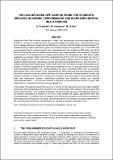| dc.contributor.author | Brennan, A. | |
| dc.contributor.author | Dempsey, Mary | |
| dc.contributor.author | O'Dea, M. | |
| dc.date.accessioned | 2018-12-18T09:52:37Z | |
| dc.date.available | 2018-12-18T09:52:37Z | |
| dc.date.issued | 2018-03-05 | |
| dc.identifier.citation | Brennan, A. , Dempsey, M., & O'Dea, M. (2018). The link between off campus work for students, reduced academic performance and increased mental health issues. Paper presented at the 12th International Technology, Education and Development Conference, Valencia, Spain, 05-07 March, doi:10.21125/inted.2018.1429 | en_IE |
| dc.identifier.uri | http://hdl.handle.net/10379/14734 | |
| dc.description.abstract | Despite the Free Fees Initiative (introduced in 1996) Irish students pay an annual registration fee of 3,000 (Cassells, 2016). This, in combination with rising accommodation and living costs, means that the annual cost of college education ranges from 4,340 (living at home) to 8,206 (rented accommodation)(Zurich, 2017). Notwithstanding student needs-based grants and financial support from parents (Zurich, 2017), it is inevitable that some students have to combine their university life with paid employment (Creed, French, & Hood, 2015). Soliz et al. (2016) state that the number of hours students are working during college appears to be increasing . Research on the effects of off-campus work on student academic performance are contradictory (Triventi, 2014), with some studies suggesting no negative impacts and others suggesting that 0-9hrs part-time work/week can result in minimal negative effects whilst longer hours can show greater negative effects on study-time (Havergal, 2017) and academic performance (Darolia, 2014). Interestingly, studies also show work-based benefits of part-time work i.e. students learn transferrable labour market skills which can ultimately increase employability post-college (Soliz & Long, 2016). However, college life is not solely about attending lectures, it is also about extracurricular social participation/interaction activities (i.e. sports/societies) that have a beneficial effect, both on academic performance and on the growth of the individual (Arulampalam, Naylor, & Smith, 2011) (Havergal, 2017). Working during third level means that there is less time to devote to these activities. This in turn can lead to increased levels of stress and feelings of isolation. A study in 2017, showed an increase in Irish students seeking help with depression, anxiety, relationships problems and academic issues has reached unprecedented levels ... a 40 per cent increase in demand for counselling over the last 10 years, with waiting lists for counselling services at many colleges (Thompson, 2017). The new norm regarding students working whilst at college and the increasing number of students experiencing mental health issues begs the question; is there a link between working part-time and increased mental health issues? Further, given that universities can no longer assume that the majority of students will be able to give their full-time attention to academic studies (Triventi, 2014), how can colleges facilitate the work-university conflict and better support their students?
In this paper, the authors present the results of a survey of 179 students comprising 109 undergraduates (44 first year, 16 third year and 49 fourth year students) and 70 postgraduate students (25 completing the Higher Diploma, 44 completing a Masters degree and 1 doctoral student). All students are studying in the College of Engineering and Informatics. Of the 179 students surveyed, 42% (75) work part-time/full-time off-campus.
The purpose of this survey is to identify:
1) the numbers engaged in off-campus work per year of the degree programme,
2) students perceptions of whether or not a link exists between off-campus part/full time work and stress/depression,
3) whether their off-campus work affects their academic performance, attendance and energy and enthusiasm for third level,
4) how they believe the university can best support them in this university-work conflict and
5) the benefits of working off-campus during term time. | en_IE |
| dc.format | application/pdf | en_IE |
| dc.language.iso | en | en_IE |
| dc.publisher | International Academy of Technology, Education and Development (IATED) | en_IE |
| dc.relation.ispartof | 12th International Technology, Education and Development Conference | en |
| dc.rights | Attribution-NonCommercial-NoDerivs 3.0 Ireland | |
| dc.rights.uri | https://creativecommons.org/licenses/by-nc-nd/3.0/ie/ | |
| dc.subject | Working part-time/full-time at college | en_IE |
| dc.subject | Increased mental health issues | en_IE |
| dc.subject | Increased stress | en_IE |
| dc.subject | Academic performance | en_IE |
| dc.title | The link between off campus work for students, reduced academic performance and increased mental health issues | en_IE |
| dc.type | Conference Paper | en_IE |
| dc.date.updated | 2018-12-13T21:38:32Z | |
| dc.identifier.doi | 10.21125/inted.2018.1429 | |
| dc.local.publishedsource | https://dx.doi.org/10.21125/inted.2018.1429 | en_IE |
| dc.description.peer-reviewed | peer-reviewed | |
| dc.internal.rssid | 15116472 | |
| dc.local.contact | Mary Dempsey, Mechanical Engineering, Eng-2048, Engineering Building, Nui Galway. 2258 Email: mary.dempsey@nuigalway.ie | |
| dc.local.copyrightchecked | Yes | |
| dc.local.version | ACCEPTED | |
| nui.item.downloads | 1063 | |


